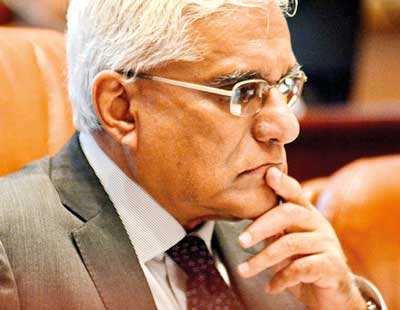Tuesday Feb 24, 2026
Tuesday Feb 24, 2026
Thursday, 5 April 2018 01:38 - - {{hitsCtrl.values.hits}}
By Uditha Jayasinghe
The Central Bank yesterday (4 April) cut the policy ceiling rate by 25 basis points to 8.50%, signalling cautious relaxation of monetary policy for the first time in two years, predicated on falling inflation and growth.
The Central Bank, explaining its reasons, pointed out the change would moderate anomalous interest rates in April and allow the interest rates to stabilise in the short term, as well as reduce the gap between deposit and lending rates. The move was also prompted by unexpected low growth of 3.1% in 2017 and a positive turn in exports, higher foreign investment, current and primary account surpluses, as well as slowing inflation, which underscored stronger growth prospects for 2018.
“The Monetary Board felt it would be timely, at this juncture, to give a signal that the tightening phase of Monetary Policy should come to an end. Up to now, there has been a fairly long period where there has been a tightening bias. Since that time, the situation has improved on inflation, which is now within the 4%-6% band, and our expectation is that inflation will remain at the bottom level of the band,” said Central Bank Governor Dr. Indrajit Coomaraswamy.
The Governor was confident the cost of living, including food prices, is on the wane. Broad money growth moderated to 16.2% in February from 16.8% in January, but net credit growth increased substantially by Rs. 77.2 billion during the first two months of 2018. The increase in 2017 was Rs. 196.4 billion. Private sector credit growth decelerated to 14.6% year on year in February 2018 from 15.2% in January 2018 and 14.7% in December 2017.
Credit to public corporations, which declined by Rs. 7.5 billion in January 2018, increased by Rs. 17.1 billion in February 2018, mainly driven by requirements of the Ceylon Electricity Board (CEB). Given this credit increase, the Governor opined it was better for the Government to move to a fuel pricing formula promptly, as it was already baked into inflation projections and would therefore have limited impact. Implementing a fuel price formula in March was announced last year as part of the International Monetary Fund (IMF) Extended Fund Facility, but the deadline was missed as political instability struck in the wake of Local Government election results. A similar price transfer of electricity has been set for September, but it is unclear whether the Government will meet it.
“The pricing formula should really come in, because this is the time to do it. All the other factors related to inflation are favourable: even food-related inflation is coming down. It’s a political decision that has to be made, but in my view the earlier the better and it is a politically astute time to do it now, because even with the introduction of the pricing formula, inflation will remain within 4%-6% and the expectation is that oil prices may ease going forward. So all that argues for doing this earlier rather than later, and it is important for budgetary requirements.”
Governor Coomaraswamy said Sri Lanka’s potential growth had been estimated at 5.7% and last year’s growth was only 3.1%, increasing the ‘output gap’ to 2.6%. The Governor noted several organisations, including the World Bank and IMF, had also expected growth to be clustered around the 4% mark last year, but final numbers were lower than expected because the Census and Statistics Department had revised numbers of the first three quarters of 2017 as well. Given the unexpectedly low performance of 2017, the initial growth target of 5% or 5.5% announced in January was also reined in.
“It is difficult to see us getting beyond 5%. Given 2017 growth clearly one would need to recalibrate, taking that into account. I would stick my neck out and say 5% or a shade under. This is a notoriously dangerous thing to do.”
However he was optimistic that the Government would be able to maintain its fiscal trajectory till at least end June. The Governor reiterated his appeal to maintain fiscal policy discipline, despite the political incentive to pump excess demand into the system. “It would be a grave mistake,” he cautioned. “That is clearly one area where we would need to be very vigilant. If there is any significant slippage then that changes the whole equation.”
The Central Bank would closely monitor external vulnerabilities, including rising US Federal Reserve interest rates, and oil prices. Improving macroeconomic fundamentals should be buttressed by political stability, the Governor acknowledged, when questioned on the No-Confidence motion yesterday.
“It goes without saying that prolonged political instability will have significant impact on economic performance. To be fair, we’ve essentially had only a few weeks of instability. The important thing now is to have some kind of stable outcome where Government will work effectively. That is the most important thing. Politics can go on, but the Government must function effectively, and the framework must exist for the Government to deliver its basic services, to formulate policy, to deliver its development programs effectively. That’s what is most important.”